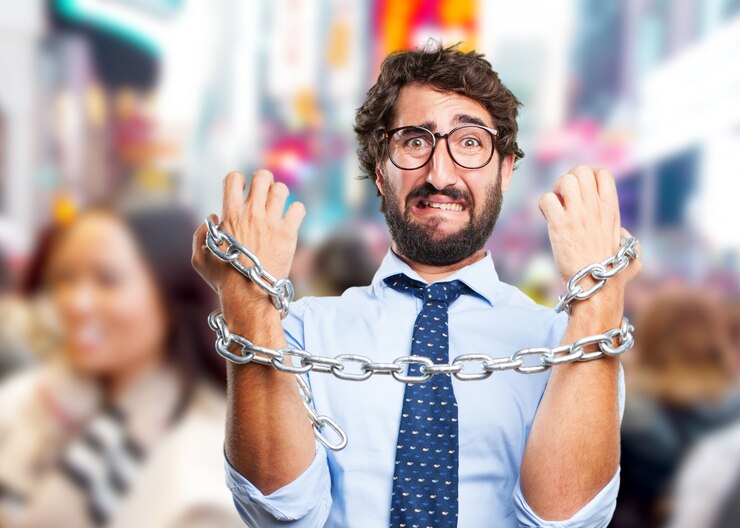Comparing a prisoner and an undocumented immigrant involves discussing two distinct legal statuses within a society. Can an undocumented immigrant relate to the sufferings of a prisoner as they evaluate their life’s miseries? Undocumented immigrants and prisoners can relate to each other’s woes in specific ways despite their different legal statuses.
- Legal Status:
- Prisoner: A prisoner is an individual who has been convicted of a crime and is serving a sentence as punishment for their actions. This person has undergone a legal process, including arrest, trial, and sentencing.
- Undocumented Immigrant: An undocumented immigrant is an individual who is residing in a country without the necessary legal documentation or authorization. This can happen for various reasons, such as entering a country without inspection or overstaying a visa.
- Reason for Detention:
- Prisoner: A prisoner is incarcerated due to the commission of a crime. The nature and severity of the crime determine the length and conditions of their incarceration.
- Undocumented Immigrant: An undocumented immigrant may face detention if immigration authorities apprehend them. This detention can occur while awaiting a legal process, such as a deportation hearing.
- Legal Process:
- Prisoner: A prisoner has typically gone through a legal process, which includes being charged, having the right to legal representation, and undergoing a trial where evidence is presented. If found guilty, they receive a sentence as determined by a court.
- Undocumented Immigrant: Depending on the country and its immigration laws, an undocumented immigrant may be subject to detention upon discovery by authorities. They may go through a legal process that could result in deportation or other legal consequences.
- Rights and Protections:
- Prisoner: Prisoners have certain rights, which can vary by jurisdiction but generally include the right to humane treatment, medical care, and protection from violence or abuse.
- Undocumented Immigrant: Depending on the country, undocumented immigrants may have certain rights under international law, such as protection from torture or inhuman treatment. However, their legal protections can be limited, especially regarding social services and access to public benefits.
- Potential for Rehabilitation or Legalization:
- Prisoner: The justice system often aims to rehabilitate prisoners, providing them with educational opportunities, vocational training, and other programs to help them reintegrate into society.
- Undocumented Immigrant: Some countries have pathways for undocumented immigrants to obtain legal status, such as asylum, refugee status, or through specific immigration policies. However, the availability of these pathways can vary widely depending on the country and its immigration laws.
- Public Perception and Stigma:
- Prisoner: A social stigma can be associated with being a prisoner, though attitudes towards rehabilitation and reintegration vary widely.
- Undocumented Immigrant: Undocumented immigrants may also face social stigma, and public opinion can be polarized on issues related to immigration.

While there are shared elements in their experiences of hardship, it’s crucial to recognize the unique nature of their circumstances. The legal, social, and economic hurdles they confront differ. Demonstrating empathy and understanding for each other’s challenges can foster a more compassionate and inclusive society. It’s worth noting that conversations surrounding prisoners and undocumented immigrants can be emotionally charged and greatly influenced by cultural, legal, and political contexts.
Here are a few reasons why they might find common ground in their experiences of hardship:
- Loss of Freedom: Both undocumented immigrants and prisoners experience a loss of freedom. Undocumented immigrants constantly fear being discovered and potentially deported, while prisoners have lost their freedom of movement entirely.
- Stress and Uncertainty: Both groups may face high-stress levels and uncertainty about their future. Undocumented immigrants may be constantly anxious about their legal status, while prisoners often face uncertainty about their sentence length and potential for rehabilitation.
- Separation from Loved Ones: Both undocumented immigrants and prisoners may experience separation from their families and loved ones. Undocumented immigrants may be separated from family members in their home country, while prisoners are physically separated from their families during incarceration.
- Stigma and Marginalization: Both groups can face stigma and marginalization in society. Undocumented immigrants may encounter prejudice and discrimination due to their immigration status, while prisoners often face societal judgment and stereotypes associated with criminal behavior.
- Lack of Access to Resources: Both undocumented immigrants and prisoners may have limited access to resources and services. Undocumented immigrants may struggle to access healthcare, education, and legal protections, while prisoners may face challenges in accessing quality healthcare, educational programs, and reintegration support.
- Vulnerability to Exploitation: Both groups may be vulnerable to exploitation. Unscrupulous employers or human traffickers can exploit undocumented immigrants, while prisoners may face exploitation within the prison system.
- Hope for a Better Future: Both undocumented immigrants and prisoners may share a hope for a better future. They may dream of achieving legal status, reuniting with their families, or building a more positive life after their current circumstances.


